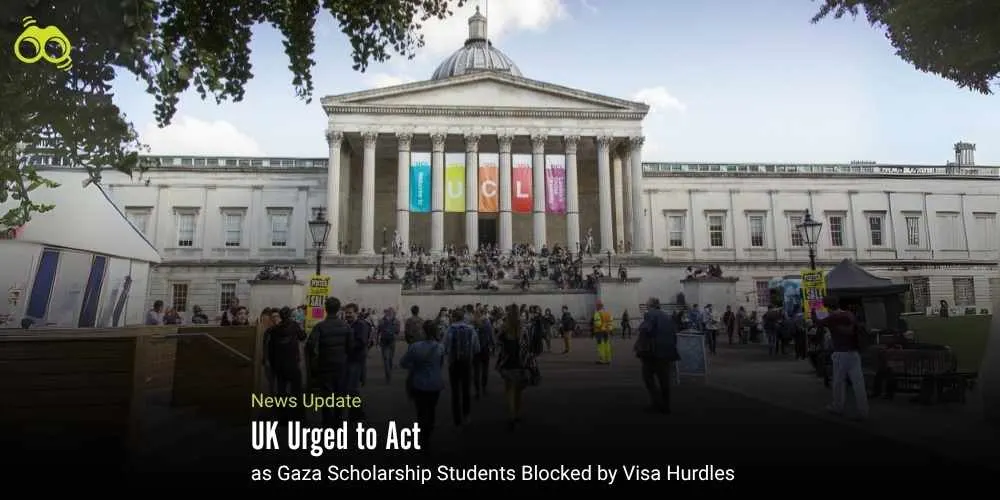MPs and Campaigners Call for Safe Passage of Gaza Students to British Universities
Home Office Holds Emergency Talks Over Gaza Students Blocked from UK Entry
In a growing humanitarian and diplomatic concern, pressure is mounting on UK ministers to take urgent action on behalf of 40 students from Gaza who have been awarded full scholarships to study at British universities. Despite securing academic placements for the September 2024 intake, these students remain unable to travel due to bureaucratic obstacles and visa delays. Consequently, the issue has prompted appeals from Members of Parliament and civil society campaigners, culminating in a high-level meeting at the Home Office on 22 July to explore possible solutions and ensure the students' safe passage to the UK.
According to campaigners, the primary barrier lies in a Home Office requirement for biometric data as part of the visa application process. However, Gaza’s only UK-approved biometric centre closed in October 2023, and students have since been unable to access alternative centres in neighbouring countries. Reports indicated that some students had already lost their lives while waiting, while others remained at constant risk.
In response, advocates have called on the UK government to grant biometric deferrals and assist in facilitating safe routes to third countries, where students could complete the visa process. Dr Nora Parr of Birmingham University noted that countries including Ireland, France, Belgium, Germany, and Italy had already taken proactive steps to evacuate their admitted students. Dr Parr further underscored the extraordinary perseverance shown by the affected students. Despite extreme circumstances, often preparing for TOEFL exams, writing admissions essays, and attending virtual interviews from tents with unstable internet, they succeeded in gaining placements at prestigious institutions.
She warned that government inaction would effectively strip them of the opportunities they had fought so hard to secure. Referring to the UK’s recent immigration white paper, she argued that the policy’s intention to reduce international student numbers, coupled with a hardline immigration stance and a lack of support for Palestine, had left these students in a state of deep uncertainty. In addition, the University and College Union (UCU), which represents 125,000 education professionals, joined the growing call for intervention. In a letter to Shadow Home Secretary Yvette Cooper, UCU General Secretary Jo Grady urged the Home Office to accelerate the process and ensure that all affected Palestinian students could begin their studies in the UK this academic year.
Furthermore, reports revealed that the student group included doctors, midwives, and mental health professionals, with offers from around 30 UK universities—including Oxford, Cambridge, St Andrews, Edinburgh, and University College London. Their areas of study range from dental public health and data science to artificial intelligence and genomic medicine. Among them is Soha, a 31-year-old midwife, who has been offered a place at the University of Ulster for a PhD in nursing and health research. She described delivering babies under fire in Gaza and called on the government to act swiftly, requesting biometric waivers and safe passage. She also expressed her aspiration to return to Palestine to lead maternal health research and train a new generation of midwives in trauma-informed care.
Meanwhile, Labour MP Abtisam Mohamed, co-chair of the All-Party Parliamentary Group for International Students, stated that Gaza’s education system had been devastated. She noted that, while several other European countries had acted to support their students, the UK had not. Urging prompt ministerial action, she warned that continued delays would place more lives at risk. Universities that had offered places to the students echoed the appeal for government support. Dr Michael Spence, president and provost of University College London, emphasised the importance of ensuring that higher education remains accessible to those affected by conflict. He commended the students’ determination and ambition, noting their intent to use education to better their communities. Any governmental assistance in removing the barriers caused by the Gaza crisis, he argued, would be invaluable. In response, a government spokesperson acknowledged awareness of the students' situation and confirmed that the support request was under consideration. The UK now has a vital opportunity to uphold its values by demonstrating leadership in education, humanitarian aid, and global solidarity.
Editor’s Note:
The ongoing situation of 40 scholarship-awarded students from Gaza highlights a deeply urgent and humanitarian concern. These students, accepted into some of the UK’s most respected universities, now face uncertainty due to visa-related delays and the absence of biometric facilities in Gaza. Despite having overcome extraordinary challenges to secure their places, many are unable to complete the visa process, and some have even lost their lives while waiting. This issue goes beyond education, it is a matter of safety, dignity, and international responsibility. While several other countries have acted swiftly to support their students from conflict zones, the UK’s delayed response raises serious questions. At its heart, this is about giving deserving students a fair chance to pursue their education and build better futures.
Skoobuzz believes that every student, regardless of where they come from, deserves the opportunity to learn in safety and dignity. The UK must uphold its values of fairness and compassion by removing unnecessary barriers and ensuring these young scholars are not left behind.














0 Comments (Please Login To Continue)